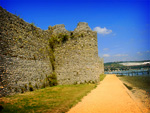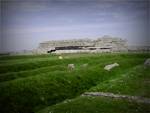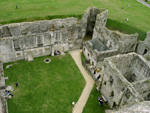Saxons and Vikings in Britain

 When the Romans left Britain in about 410 AD, successive waves of invaders and settlers arrived. At this time, Saxons, Angles, Jutes and Frisians all settled in Britain, after having themselves been displaced during a European-wide series of upheavals set in train by the Huns. The term Anglo-saxons refers to the Germanic tribes who came to dominate English life, as shown in the name of the country - from Angle-land. The Anglo-Saxon era lasted for 600 years, until 1066. During this time, the Celts were pushed to the margins of Britain, enslaved or killed.
When the Romans left Britain in about 410 AD, successive waves of invaders and settlers arrived. At this time, Saxons, Angles, Jutes and Frisians all settled in Britain, after having themselves been displaced during a European-wide series of upheavals set in train by the Huns. The term Anglo-saxons refers to the Germanic tribes who came to dominate English life, as shown in the name of the country - from Angle-land. The Anglo-Saxon era lasted for 600 years, until 1066. During this time, the Celts were pushed to the margins of Britain, enslaved or killed.
A main feature of the Anglo-Saxon legacy is the English language. English is a hybrid formed from many languages. However, a large part of our current language can be traced directly to its germanic roots in the languages of these invaders.
The first Saxons remained in small tribal groups, but over time strong kings began to dominate large areas. By the ninth century, the country had been split between the kingdoms of Northumbria, Mercia, East Anglia and Wessex. Wessex successfully challenged the Viking invaders. England as a whole was united under the Wessex king Edred, after the Wessex army's defeat of Eric Bloodaxe in 954, From then until the Norman Conquest, England was an Anglo-Saxon kingdom.

 The Anglo-saxon Chronicle, which can be accessed online at http://www.britannia.com/history/docs/asintro2.html provides the best evidence about Anglo-Saxon politics. The Chronicle was started in A.D. 890 and maintained until 1154. It was written in Anglo-Saxon (Old English) and an early form of Middle English. It is partly a faithful record of events and partly mythical and has some interestingly quirky comments from indivdiual compilers.
The Anglo-saxon Chronicle, which can be accessed online at http://www.britannia.com/history/docs/asintro2.html provides the best evidence about Anglo-Saxon politics. The Chronicle was started in A.D. 890 and maintained until 1154. It was written in Anglo-Saxon (Old English) and an early form of Middle English. It is partly a faithful record of events and partly mythical and has some interestingly quirky comments from indivdiual compilers.
The original Saxons were pagans with their own typically Northern European belief system. Some relics of Saxon belief have survived, in the names of weekdays, for example (Wednesday is called after Wotan). After 597, when St Augustine brought Christianity to Britain, most of the country converted to Christianity.